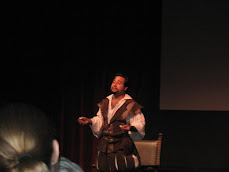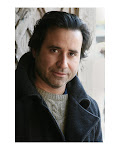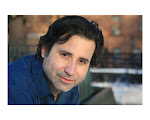by Sara Weist, Co-Editor
Daily Tar Heel
Chaz Mena, an actor from Florida, came to UNC on Nov. 17 to perform a short theatrical work about the life of José Martí.
Cuban intellectual José Martí (1853-1895) is most famous for his works of literature, his diplomatic endeavors and his role in the fight for Cuban independence from Spain. "He's like an uncle, like a member of the family, he's always there," Mena said. "You just can't get rid of him. He's always there; he's always present." Mena's presentation was in the Chatauque style, which is a dramatic attempt to represent a historical figure outside the context of a specific scene. This Chatauqua work was in the form of a conversation between the audience and the historical figure Martí. Kathy Ibarra, a UNC junior, said she liked the Chatauqua style. "It made it possible to speak with a historical figure that no one from our generation will ever be able to talk to," she said. "I am studying abroad in Cuba in the spring, so for me this was an awesome opportunity because Martí is a very important figure in Cuban culture." In the presentation, Mena spoke about the all aspects of Martí's life, both personal and political. "The Spanish say that in Cuba we are bitter," Mena said. "We are not bitter; we are dying." Mena also spoke about Martí's family life. "I was married, but my wife has since left me and returned to Cuba," he said. "But sometimes in the mornings, I feel something, and I know that what I am feeling is that my son is going to wake up." Mena is traveling throughout the country presenting his work, and he said he was especially looking forward to coming to UNC. "I was really excited about coming to UNC, more that anything because of what I had learned about Louis Pérez and the work that he is doing here," Mena said. Pérez is a history professor and director of the Latin American Studies program. His research focuses mostly on the history of the Spanish-speaking Caribbean during the 19th and 20th centuries. Pérez, who also attended the performance, said he was happy with how things had gone and he thought it is important for more people to learn about the life of José Martí. "I want everyone to read Martí's works," he said. "He is a central figure in the history of Latin America."
Subscribe to:
Post Comments (Atom)





















No comments:
Post a Comment